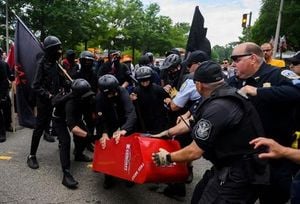In a swirling legal and political drama that has gripped Oregon and drawn national attention, the question of whether President Donald Trump can deploy National Guard troops—federalized under his orders—to Portland remains unresolved. Despite a flurry of court orders, appeals, and pointed rhetoric from all sides, the city stands at the center of a high-stakes conflict over federal power, state sovereignty, and the nature of protest in America.
On October 8, 2025, the Ninth Circuit Court of Appeals issued a ruling that partially lifted a previous order blocking the deployment of 200 Oregon National Guard members to Portland. The panel of three judges—Susan Graber, appointed by President Bill Clinton, and Ryan Nelson and Bridget Bade, both appointed by Trump—granted what’s known as an administrative stay. The effect, as the panel stated in its four-page order, is to “preserve the status quo in which National Guard members have been federalized but not deployed.” In other words, while the troops remain under federal control, they cannot yet be sent into Portland.
This legal maneuver does not, however, grant the Trump administration the authority it seeks. A broader and still-active order from U.S. District Judge Karin Immergut, issued on October 5, continues to bar the deployment of any National Guard troops—whether from Oregon or any other state—into Portland. The Trump administration has, as of this writing, not formally appealed or challenged this second, sweeping order. As the Ninth Circuit panel noted, “Defendants have not appealed or challenged the second temporary restraining order, and it is not before us.”
The roots of this legal saga stretch back to late September, when President Trump announced his intention to deploy the Oregon National Guard to Portland. Claiming the city was a “war zone” and likening the situation to “World War II,” Trump authorized federal troops to guard federal buildings and an Immigration and Customs Enforcement (ICE) facility that had been the site of months of small and mostly non-violent protests. “Domestic terrorists,” he asserted, had put the city “under siege.”
State and local officials, however, painted a very different picture. In her October 4 ruling, Judge Immergut concluded that the conditions in Portland were “not significantly violent or disruptive” and that the president’s claims were “simply untethered to the facts.” She further wrote, “The protests in Portland are not by any definition a ‘rebellion’ nor do they pose the ‘danger of a rebellion,’ and that officials of the federal government ‘have made a range of arguments that, if accepted, risk blurring the line between civil and military federal power—to the detriment of this nation.’”
The legal back-and-forth escalated when the Trump administration, after being blocked from deploying Oregon Guard members, attempted to send federalized troops from California and Texas into Oregon. California quickly joined Oregon and the city of Portland in seeking a second restraining order, which Judge Immergut granted, temporarily barring any state’s National Guard from being deployed to Portland. Immergut warned Department of Justice attorneys that the government’s attempt to use California troops in Oregon was “in direct contravention” of her earlier decision.
Meanwhile, the Oregon National Guard troops—about 200 of them—have been training at Camp Rilea in Warrenton since late September, while roughly 200 California National Guard members are stationed at Camp Withycombe in Happy Valley. All told, around 400 troops are under the command of U.S. Northern Command, a federal military authority based in Colorado. Governor Tina Kotek, who has been vocal in her opposition to the federalization, requested on October 7 that “all soldiers be sent home.” But the current court orders prevent her from doing so, at least for now.
Attorney General Dan Rayfield, in a statement following the Ninth Circuit’s latest ruling, called it a victory for the state. “While it keeps the Oregon National Guard under federal status, most importantly, it prevents the President from deploying the guard in Portland. That means no unnecessary federal escalation—and that’s a win for Oregonians who want calm, not conflict in our communities,” Rayfield said.
Governor Kotek echoed this sentiment, declaring, “I will keep holding the line against President Trump’s abuse of power and stand up for Oregonians.”
The Trump administration, undeterred, continues to argue that federal intervention is necessary. In a White House meeting on October 8, Trump accused protesters in Portland, Chicago, and other cities of “laying siege” to federal buildings. Secretary of Defense Pete Hegseth, acting on Trump’s orders, federalized the Oregon Guard for at least 60 days to “protect federal personnel and property in Portland.”
Adding fuel to the fire, Department of Homeland Security Secretary Kristi Noem made an unannounced visit to Portland and the ICE facility on October 7. After meeting with Governor Kotek, Portland Mayor Keith Wilson, and Portland Police Chief Bob Day, Noem appeared on Fox News and dismissed the local officials as “a bunch of pansies.” Her comments, unsurprisingly, drew sharp criticism and further polarized the debate.
All of this legal wrangling and political theater has left Portland’s fate hanging in the balance. Oral arguments on the Trump administration’s appeal of Judge Immergut’s first order are scheduled for October 9 at 9 a.m. in the Ninth Circuit. The outcome of those arguments could determine not only the immediate future of the Oregon National Guard, but also set a precedent for the use of federalized state troops in other cities. Already, similar disputes are unfolding in Chicago, where Texas National Guard troops have been federalized for potential deployment over the objections of Illinois officials. Chicago and the state of Illinois have filed their own lawsuit, with a federal judge set to hear arguments on October 9.
At the heart of the conflict is a fundamental question: who gets to decide when federal troops can be used to quell unrest in American cities? Trump’s critics argue that his actions represent an overreach of executive power and an affront to state sovereignty. Supporters, meanwhile, insist that strong federal action is needed to protect federal property and restore order in cities beset by protest—even if those protests are largely peaceful.
The judges themselves have been careful to note that their administrative stay “does not constitute in any way a decision as to the merits” of the case. Their ruling, they emphasized, is meant only to maintain the status quo while the legal arguments play out. Yet, for the National Guard troops training in Oregon, the city officials bracing for possible escalation, and the residents of Portland caught in the crossfire, the stakes could hardly feel higher.
As the legal and political battle continues, Portland remains a symbol of the broader national debate over protest, federal authority, and the limits of presidential power. The next chapter will unfold in court, but the outcome will resonate far beyond the city’s borders.





